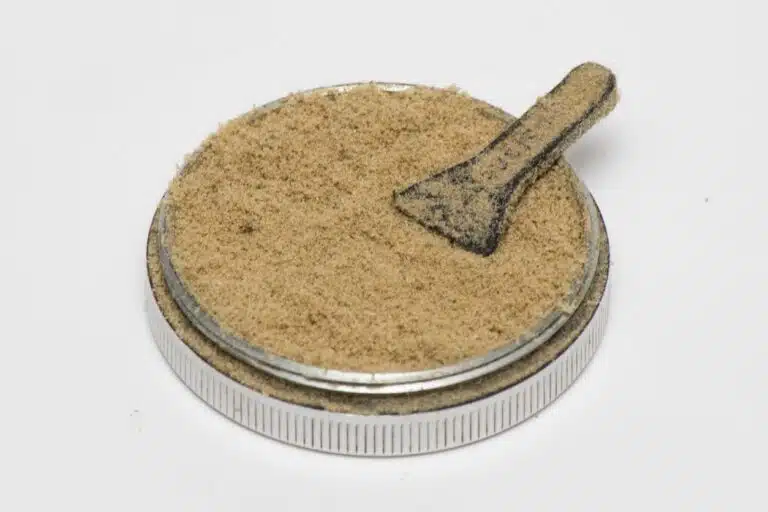Cannabis (marijuana) is among the most widely used drugs in the world. As it becomes more popular, so do cannabis byproducts. One of these byproducts is called kief. Like cannabis itself, kief poses some health risks.
What Is Kief?
Kief is a cannabis concentrate that comes from trichomes.
Trichomes are tiny, resinous glands that coat the cannabis plant. They contain cannabinoids (compounds from cannabinoids) such as THC (the psychoactive ingredient in cannabis) and CBD. They also contain terpenes, which are compounds that give cannabis its smell and flavor.
When trichome heads dry up and fall off the cannabis flower, they become kief. People collect kief using grinders with bottom chambers called kief catchers. Some people also use kief boxes, which are containers designed to collect large amounts of kief.
Using Kief
Kief can be used in multiple ways. Many people press kief into small balls to make a form of cannabis called hashish. Other people use kief by:
- sprinkling it on a bowl, joint, or bong and then smoking it
- vaping or dabbing it in a vaporizer device
- mixing it with cannabutter to make kief brownies or other edibles
- using it to make moon rocks, which are nugs (pieces of marijuana) covered in cannabis oil and rolled in kief
Common nicknames for kief include “pollen,” “dry sift,” and “cannabis crystals.”
Effects Of Kief
Kief is highly potent. While cannabis buds typically contain between 12% and 25% THC, kief can contain anywhere from 25% to 70% THC. That means kief can make you feel much higher than standard cannabis.
While high on kief, you may experience a range of effects, including:
- altered sense of time
- altered senses, such as seeing brighter colors
- euphoria (intense joy)
- relaxation
- increased appetite
- poor memory
- trouble concentrating
- increased heart rate
Some people also experience anxiety and paranoia, especially if they use high doses.
Risks Of Kief
Like other cannabis products, kief poses the following health risks:
Psychosis
Psychosis is a temporary loss of connection with reality. It typically involves paranoia, delusions (beliefs that conflict with reality), and hallucinations (images, sounds, or sensations that aren’t really there).
Generally, the more THC you consume, the more likely you are to experience psychosis. Because kief contains more THC than other cannabis products, it may pose a higher risk of psychosis.
Breathing Problems
Like smoking other drugs, smoking kief can irritate your lungs. If you do so frequently, you may experience breathing problems such as coughing, phlegm, and a greater risk of lung illness and infection.
Nausea & Vomiting
If you use kief or other cannabis products on a regular basis for a long time, you may develop Cannabinoid Hyperemesis Syndrome. This condition causes frequent, severe episodes of nausea and vomiting. Some of these episodes require medical intervention.
Poor Brain Development
Kief and other cannabis products may hinder brain development in users under age 18. This can lead to problems with learning, memory, and attention.
Pregnancy Problems
Using kief while pregnant may lead to poor fetal growth, premature birth, or stillbirth. It can also affect your baby’s brain development, increasing the risk of hyperactivity and impaired cognitive function.
Addiction
Some people think kief and other cannabis products are not addictive. However, if you regularly use kief, you may develop cannabis use disorder. This condition makes you feel unable to stop using cannabis products even if you want to. Other symptoms may include:
- strong cravings for cannabis
- loss of interest in activities once enjoyed
- loss of motivation
In addition, you may become physically dependent on cannabis. That means your body starts relying on the substance to function normally. If you stop using it, you may experience withdrawal symptoms such as:
- anxiety
- irritability
- reduced appetite
- trouble sleeping
Kief Addiction Treatment Options
If you think you or someone you love may be addicted to kief, seek help at a substance abuse treatment program. These programs offer a variety of treatments, such as:
- medical detox, in which doctors help you manage withdrawal symptoms as you stop using cannabis
- behavioral therapy, in which a mental health professional helps you change unhealthy behaviors and beliefs related to your cannabis use
- support groups, in which you can discuss your experiences with other people in recovery from cannabis addiction
To learn more about kief addiction treatment, please reach out to an Ark Behavioral Health specialist. Our inpatient and outpatient treatment programs offer personalized, evidence-based care to help you or your loved one stay healthy.
Written by Ark Behavioral Health Editorial Team
©2024 Ark National Holdings, LLC. | All Rights Reserved.
This page does not provide medical advice.
American Journal of Drug and Alcohol Abuse - Leveraging user perspectives for insight into cannabis concentrates
Centers for Disease Control and Prevention - Health Effects of Marijuana
National Institute on Drug Abuse - Cannabis (Marijuana) DrugFacts
Substance Abuse and Mental Health Services Administration - Know the Negative Effects and Risks of Marijuana Use

Questions About Treatment?
Ark Behavioral Health offers 100% confidential substance abuse assessment and treatment placement tailored to your individual needs. Achieve long-term recovery.
100% confidential. We respect your privacy.
Prefer Texting?
Our friendly support team is here to chat 24/7. Opt out any time.








 Learn More
Learn More








